
 |
||||
|---|---|---|---|---|
| Volume 50 Number 39, October 31, 2020 | ARCHIVE | HOME | JBCENTRE | SUBSCRIBE |
Workers' Weekly Internet Edition: Article Index : ShareThis
Move to entrench police powers above the rule of law:
United Kingdom Internal Market Bill
Online Meeting on the Covert Human Intelligence Sources (CHIS) Bill - An Attack on the Rights of AllThe Necessity for an anti-war government:
Government Gives Arms Industry Extra Tens of Millions of Pounds during Covid-19 Pandemic
Britain Was Second Biggest Arms Dealer for Last Decade, Figures ShowMove to entrench the power of the monopolies to impose trade agreements:
Successful National Day of Action against the Government's Proposed Trade Deal with the United StatesDefending the right of all to health care as a human right:
Save Lewisham Hospital Campaign Holds Picket against Charging Migrants for NHS HealthcarePetition:
Hold a Public Inquiry into Government Contracts Granted During Covid-19Workers' Forum:
Rolls Royce Workers Announce Three-Week Strike in Defence of Job Security and a Viable Economy
Engineering Workers in Walsall Militantly Demonstrate against Draconian Pay CutsThe present food poverty amongst the unemployed and low paid:
Anniversary of the National Hunger MarchResponses to the US election - what now for Cuba?:
ONLINE MEETING - Cuba Solidarity CampaignSUPPLEMENT:
Westminster Hall Debate on the Rule of Law
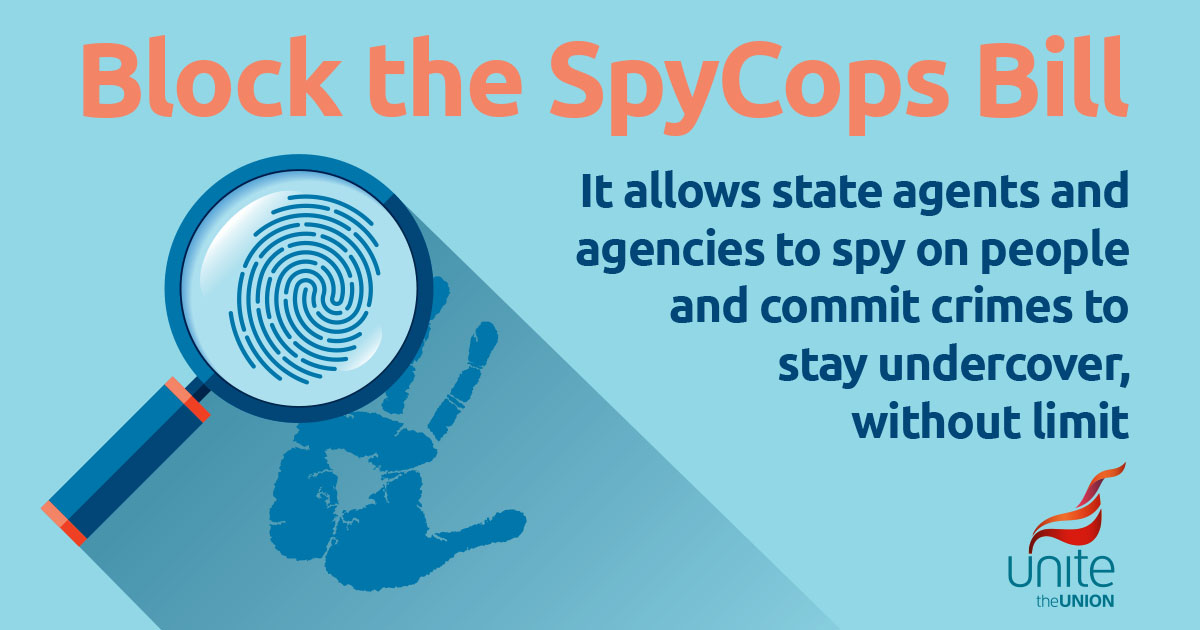
In addition to the UK Internal Market Bill, there are currently two further Bills before Parliament which legally place the police powers, as well as the armed forces, outside the scope of the civil power. Both the Overseas Operations (Service Personnel And Veterans) Bill and the Covert Human Intelligence Sources (Criminal Conduct) Bill seek to create special classes of defendants in domestic law in respect of whom the criminal law will not apply [1]. These Bills are consistent with the overall restructuring of the state which has been ongoing and which is at the heart of the neo-liberal anti-social offensive.

The proposed legislation exposes and consolidates a pro-war government, one that is not just pro-war in the sense of its foreign policy, but is based on a permanent state of emergency in the sense of the enemy being "terrorism" or "extremism", which has been legislated on particularly since 2001, but dates back to the Prevention of Terrorism Act of 1974 and before, when emergency powers were conferred on the police. This is the nature of British democracy, which sees its colonial and imperialist history in glowing terms and defines this history in terms of wiping out the opposition it terms terrorism. Today, when imperialist globalisation holds sway, the national and international arrangements that the imperialist forces are putting in place lead to prolonged suffering, corruption, destruction and war and must be and are being opposed.
"Emergency" legislation presupposes a permanent state of exception, as it has been particularly since the time of Tony Blair, who declared in 2005 that the main enemy was "mass terrorism", that "the rules of the game have changed", and that the danger was from "Islamist extremism" and "revolutionary communism". This is presented as defence of democracy, which is what is being presented now, and has been developed since Blair elaborated the Third Way. Before then, the Irish people fighting for sovereignty and independence were the "extremists" whom the British state denigrated and organised to assassinate. The Undercover Policing Inquiry and the work done by the Undercover Research Group has itself exposed the extent of the criminality of the so-called "spycops" [2], a criminality which the CHIS Bill now seeks to legalise, as does the Overseas Operations Bill. What is so shocking nowadays is the sweeping away of any means or mechanism for accountability of the government and the mea sures to which they are giving the green light.

State powers are also being extended to be imposed on schools. A state ideology centred on this definition of "extremism" is being enshrined in "guidance" to schools. The "guidance" is a kind of handbook about the essence of this "democracy", which, at the same time as in words claiming that it is for civil liberties, includes opposition to capitalism as a hallmark of "extremism". And in the Westminster discourse, the European Convention on Human Rights is being treated as something foreign and alien, along with the European Court of Human Rights. This is meaning that freedom of expression and the right to conscience are under attack. Any material associated with the "extremism" of opposition to neo-liberalism, private property, and a Westminster system of democracy is debarred. The irony is that it is these very values which the state claims to protect which are being sent into crisis.
These measures are being opposed, and the fight to oppose them is being stepped up against the neo-liberal offensive through the movement of the working class and people for their rights. This includes opposition to the building of a war economy and the associated plundering of the public treasury.
The issue therefore is not to defend a democracy that is being lost through the imposition of a state ideology and the suspension of civil liberties, but in exposing the essence of that "democracy", to fight for the rights of all, and work for democratic renewal. This is the urgency of the striving for empowerment.
Note
1. See the For Your Information article below. Also see
Supplement at end.
2. For this research in relation to RCPB(ML), see the
profiles on Powerbase:
https://powerbase.info/index.php/Desmond_%27Barry%27_Loader_(alias)
https://powerbase.info/index.php/Malcolm_Shearing_(alias)
The judge-led public inquiry was launched six years ago by the home secretary at the time, Theresa May, after it was revealed how police had covertly monitored the campaign for justice over the racist murder of Stephen Lawrence. The inquiry is now to resume next week under retired judge Sir John Mitting. It will begin by hearing evidence from the period 1968-1972, particularly on the infiltration by the state of the movement against the Vietnam War. Overall the inquiry is due to scrutinise the deployment of nearly 140 undercover officers who spied on more than 1,000 political groups across more than four decades. Workers' Weekly will report on proceedings as they unfold.
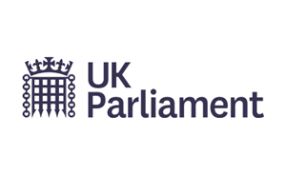
"To make provision in connection with the internal market for goods and services in the United Kingdom (including provision about the recognition of professional and other qualifications); to make provision in connection with provisions of the Northern Ireland Protocol relating to trade and state aid; to authorise the provision of financial assistance by Ministers of the Crown in connection with economic development, infrastructure, culture, sport and educational or training activities and exchanges; to make regulation of the provision of distortive or harmful subsidies a reserved or excepted matter; and for connected purposes."
At present in its committee stage in the House of Lords, continuing until November 2, when further amendments will be discussed. It received its third reading in the Commons on September 29, and its second reading in the Lords on October 19.
For further information see the Supplement below on the rule of law, and the
briefing paper:
https://commonslibrary.parliament.uk/research-briefings/cbp-9003/
"A Bill to make provision for, and in connection with, the authorisation of criminal conduct in the course of, or otherwise in connection with, the conduct of covert human intelligence sources."
Receiving its second reading in the House of Commons on October 5, the Bill completed its committee stage, report stage and third reading all on October 15. The second reading in the Lords is yet to be scheduled.
The bill would provide an express power to authorise covert human
intelligence sources (CHIS) to participate in conduct which would otherwise
constitute a criminal offence. It would do this by amending the Regulation of
Investigatory Powers Act 2000. The bill would provide the security and
intelligence agencies, law enforcement agencies, and several public authorities
a statutory power to authorise CHIS to participate in criminal conduct, when
deemed necessary and proportionate to do so. For further information see:
https://lordslibrary.parliament.uk/research-briefings/lln-2020-0124/
"A Bill to Make provision about legal proceedings and consideration of derogation from the European Convention on Human Rights in connection with operations of the armed forces outside the British Islands."
Receiving its second reading in the House of Commons on September 23, the Bill is now due to have its report stage and third reading on Tuesday, November 3, before progressing to the Lords.
It is expected that several issues will be returned to on Report,
specifically, the application of the presumption against prosecution provisions
in this Bill to torture, war crimes and crimes against humanity; and the
proposed six-year time limit for bringing civil claims in relation to overseas
operations. Critics have argued that this limit erodes the rights of Service
personnel and veterans and potentially breaches the Armed Forces Covenant. For
further information see:
https://commonslibrary.parliament.uk/research-briefings/cbp-8983/

The Stop the War Coalition held an online meeting on October 22 to discuss the Covert Human Intelligence Sources (Criminal Conduct) Bill, which was rushed through the House of Commons before going to the Lords. Speakers were: Zara Sultana MP, Baroness Shami Chakrabarti, Sinn Féin MP John Finucane, Kate Wilson of Police Spies Out of Lives, Unite Assistant General Secretary Howard Beckett, and Shabbir Lakha of the Stop the War Coalition.
The meeting was held in the wake of the third reading in the House of Commons of the CHIS Bill, known as the so-called "Spy Cops Bill". The online statement of Stop the War points out the Bill "allows authorisation by a wide range of state organisations for undercover agents to commit crimes as part of their work" ... "including rape and murder".
This meeting heard from an expert platform of speakers that connected the political issues with personal testimony. This was particularly true of Kate Wilson, who was deceived into a relationship with a police spy, and John Finucane MP, who has been fighting against the pernicious role of police spies since his father Pat was murdered with the collaboration of police intelligence in 1989.
The tone of the meeting was very positive with people speaking out and determined to take a stand against the measures the government is trying to impose. Indeed, the fact that the meeting happened at all demonstrated that what the government is doing is not without opposition.
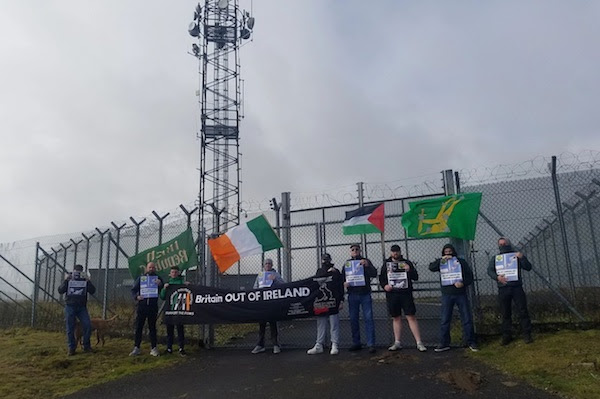
Protest against British spy communications systems in
Ireland
Addressing the meeting, which included over 300 online participants, Sinn Féin MP John Finucane said that the British government cannot be allowed to put its state agents above the law. The North Belfast MP said: "The Covert Human Intelligence Sources Bill is a direct attack on democracy, human rights and justice. The danger of this legislation is that it provides no political or judicial oversight to the most serious of crimes committed by state agents, including murder and torture. It would prevent future victims seeking redress through the courts and ensure that those who have exposed wrongdoing in the past would be incapable of doing so in the future."
Finucane spoke most eloquently about his own experience which, he said, "included the assassination of my father and human rights lawyer, Pat Finucane, by loyalist death squads acting under the direction of the British state". His concern, he said, is that "over decades, state agents and their proxies in loyalist death squads effectively had a license to kill and were involved in countless killings of people across the island". His message was that "state agents and informers cannot be placed above the rule of law. They cannot be allowed to act without fear of any accountability or prosecution."
Baroness Shami Chakrabarti made the point that "what happens at the moment is that any prosecutor, any police officer, who is looking to bring charges against somebody will look not just at the evidence of what they've done but will look at the public interest". However, "with this legislation .... This bill is not about putting Covert Human Intelligence Sources (Criminal Conduct) on a statutory footing, that was done in 2000; this isn't just about criminal conduct but it is about giving immunity in advance of your [the police] activity. That's why some people call it the Licence to Commit Crime Bill, because there is no limitation on the offences that you are allowed to commit. And this is a huge step in any democracy."
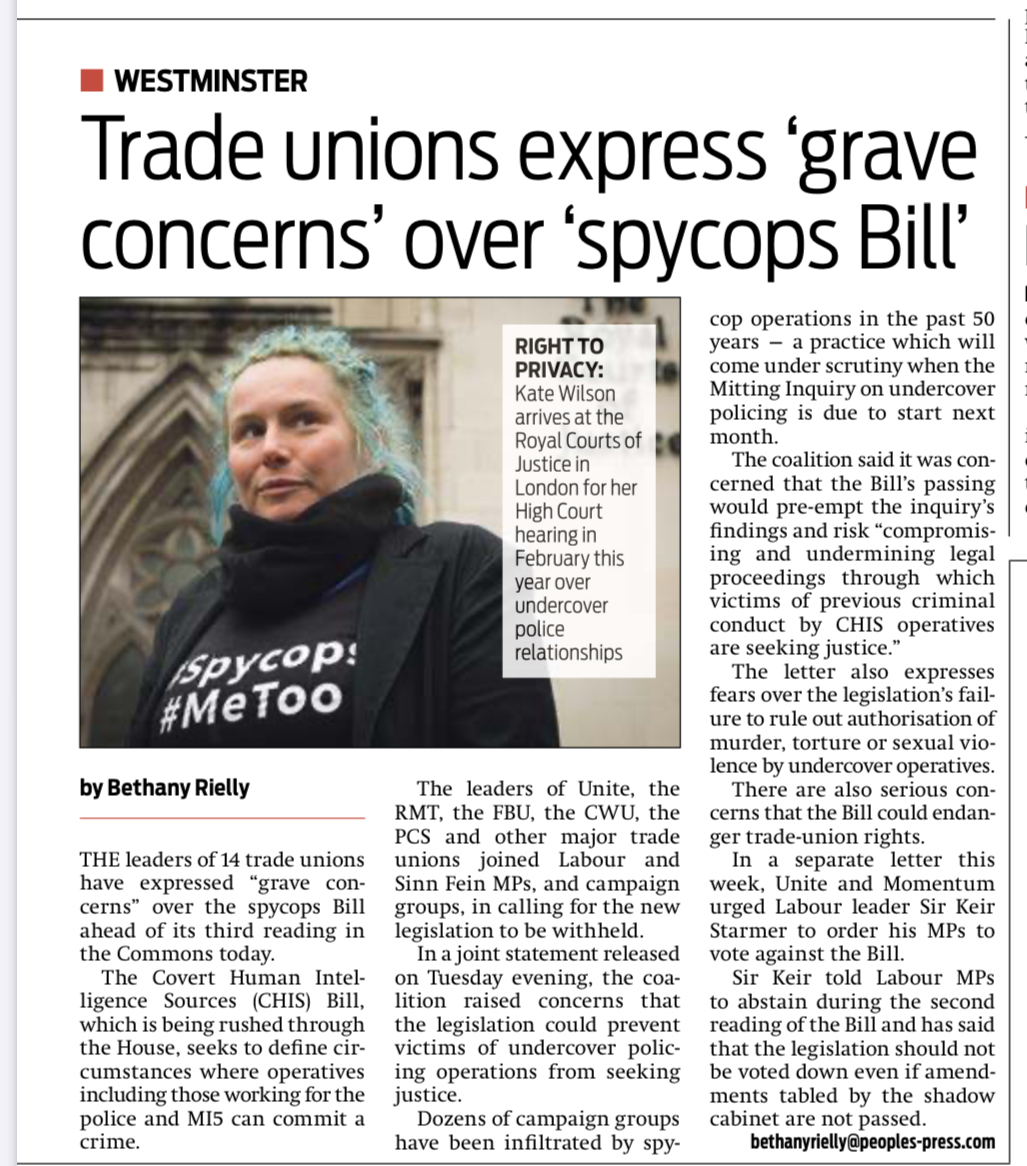
Trade unions express grave concern. Photo of Kate
Wilson
This was poignantly illustrated in the testimony of Kate Wilson from Police Spies Out of Lives, who said this was the first time she had spoken at a meeting such as this. She talked about her experiences of having been entrapped in 2003 by a man she knew as Mark Stone. Thinking him to be a genuine person, she fell in love with this man and said that they were life partners for two years. Following this they separated. However, it was only in 2010 that she discovered that he had been an undercover police officer, whose real name was Mark Kennedy.
She said: "I am very concerned about the timing of this Bill. It feels like it is very clearly being rushed through to avoid scrutiny and to avoid the lessons that are going to come out of claims like mine. My claim was due to be resolved in April. The Undercover Policing Enquiring will start hearing evidence next month. And then of course, there is the claim against MI5 that is now going to appeal that seems to have prompted this whole Bill happening in the first place." She concluded that "the CHIS Bill is basically going to make everything that we fought for pointless because it will allow them to do the things that they did to us lawfully without anybody having the right to recourse; to even find out what was done to them. And it needs to be stopped."
Howard Beckett, Assistant General Secretary of Unite, drew attention to how the legislation looks to legitimise the actions of undercover police, and that no crime is said to be unlawful under the Bill, including rape and murder. There is no oversight of the state, no accountability under the Bill. Howard Beckett said, "The reality of this Bill is that the State is being authorised to undertake crimes against society, the most severe crimes against society, with subjective tests which allow them immunity with respect to prosecution." He added: "The FBI in America have more legal requirements for transparency than will be required of our Spy Cops under this legislation. That's how serious it is." Furthermore: "The reality of this legislation is that it comes after we've just had legislation passed for immunity in respect of those who commit crimes abroad, five years for those that commit crimes of the state abroad. It comes on top of the fact that we have the Trade Union Act and all of its prescriptive legislation. Legislation is becoming a mountain now."

Shami Chakrabarti speaking at the meeting
What the whole meeting revealed is that the British government can be seen to be rushing legislation through Parliament under the cover of the current Covid-19 crisis and the difficulty of both scrutiny and protest at this time. It is shifting or reorganising the state arrangements to one of police powers being above of civil society, and exposing the nature of British "democracy".
The conviction of the Stop the War online meeting was that this poses very real dangers to the lives and human rights of everyone in Britain today. And, as John Finucane said in relation to Ireland, "Instead of concealing the truth and providing further cover for state agents, the British government must fulfil its commitments made in the Stormont House Agreement and implement the legacy measures in a human rights compliant manner."
The meeting concluded with a united determination to take a stand against this Bill and in defence of the rights of all. It asserted that this Spy Cops Bill represents, as the title suggested, "An Attack On Us All" and that the move to entrench police powers above the rule of law must be opposed.
The full meeting is available to view: [https://www.facebook.com/watch/?v=352057015869448]
Joshua Stein, Byline Times
Joshua Stein reveals how defence contractors are booming while the rest of the British economy suffers from the impact of the Coronavirus crisis
The Ministry of Defence has forked out hundreds of millions of pounds to its favoured clients in 2020, in the face of the economic ruin caused by the COVID-19 pandemic.
A Byline Times investigation has revealed multi-million-pound contracts signed by the MoD surged by more than £30 million between April and July 2020, despite the economic toll of the Coronavirus pandemic.
In comparison to 2019, the ministry's 10 top contractors - headed by BAE Systems and Babcock International - took in an extra £32 million worth of profits from contracts with the MoD.

The scale of the UK's arms exports, from 2015 to 2020.
The two countries which received the most exports were Saudi Arabia (£5.4
billion) and the USA (£2.8 billion). Data from the Campaign Against the
Arms Trade
The MoD paid the 10 companies a total of £712.4 million for contract work in just four months, in comparison to £679.6 million in the same period the previous year. Statistics firm Statista revealed that these 10 companies were the MoD's "leading suppliers" in 2018-2019.
While contract data is vague, some of the expenditure has been traced back to the industry giants.
BAE Systems, which was the highest paid MoD contractor in 2018/2019, received £200 million worth of funding towards its dreadnought submarine work in the six months leading up to June 2020. Much of that period was spent under lockdown, which began in England on 23 March. The documents do not disclose when exactly the £200 million was spent on the submarine fleet.
The dreadnought submarines, expected to cost £7.2 billion by the end of production, will replace the Royal Vanguard class of submarines, which carry the UK's nuclear deterrent.
Overall, BAE took £353.9 million of the MoD's money between April and July, an increase of more than £45 million on the same period in 2019. The British security and defence firm - which refers to the MoD as its "main customer" in its most recent half year report - has been criticised repeatedly for exploiting the much-publicised 'revolving door' of government positions and the arms industry.
BAE's chief lobbyist, Oliver Waghorn, previously worked as a special advisor to Conservative MP Liam Fox while he was Defence Secretary. Under Prime Minister Theresa May, Fox was then made International Trade Secretary, which involves managing trade regulations with other countries.
BAE continues to secure large contracts with countries including Saudi Arabia, which has been accused of human rights abuses in its proxy war in Yemen.
In August, the Campaign Against the Arms Trade (CAAT) said that "a disturbing number of senior government officials, military staff and ministers have passed through the 'revolving door' to join arms and security companies".
"This process has helped create the current cosy relationship between the Government and the arms trade - with politicians and civil servants often acting in the interests of companies, not the interests of the public," the CAAT report continued.
In total, BAE made £559 million worth of profit in the six months leading up to June 2020, according to its half year report.
Campaigners have called for the nuclear deterrent, also known as Trident, to be scrapped for moral and economic reasons, with the Scottish First Minister Nicola Sturgeon saying last year that she has "a moral objection to weapons of mass destruction".

Byline Times' investigation further suggests that the defence industry is a top priority for the Government. During the COVID-19 pandemic, the expenditure on these 10 firms dwarfed the Government's expenditure on ventilators as the virus peaked.
According to a National Audit Office report published in September, £569 million was spent on ventilators during the pandemic - in comparison to the £712 million spent on defence contracts with these 10 companies alone.
A picture containing graphical user interface Description automatically generated
Andrew Smith, a spokesperson for CAAT, which monitors and campaigns against the UK's arms industry, said that the revelations "expose the warped priorities of Government".
"The COVID crisis has been mishandled from the start, yet Government has continued to spend huge sums on extravagant military projects that do nothing to protect us from real threats like financial instability and pandemics," he told Byline Times.
"Once the crisis is over, there must be a full evaluation of UK security policy. It cannot be right that billions of pounds are being spent on aircraft carriers and weaponry, when nurses and doctors have struggled to get protective equipment. Our security is strengthened by building a fairer and more equitable society, and by investing in public services, not by lining the pockets of arms dealers."
Key Workers

The Fourth Astute class nuclear powered submarine HMS
Audacious outside its indoor ship building complex at BAE systems in 2017.
Photo: Owen Humphreys - Press Association Archive Images.
Questions should be asked about why the Government worked to keep money flowing into the arms industry at the height of the pandemic, despite the economic shock of the virus leading to businesses around the UK suffering, and some closing.
Annual statements by contractor Babcock - the second-highest earner from the MoD in 2018-2019 - reveal that its work in the defence industry was "declared to be critical and our people designed as key workers" during the pandemic. In a statement, the company's chief executive, Archie Bethel, said that "all of our major sites remained open".
Key workers during the pandemic included doctors, nurses, teachers and policemen, and other workers who provide an essential service to the UK. Babcock's contracts with the MoD include a substantial £1.25 billion agreement signed last November to produce five frigate ships for the Royal Navy. The contract will come to an end in 2028.
A MoD spokesperson told Byline Times: "Following Government guidelines, contractors critical to the delivery of key defence and national security outputs were classed as critical workers. Defence Secretary Ben Wallace has praised the MoD's partnership with Britain's defence industry, which maintained its critical output during the Coronavirus pandemic."
Babcock's chief executive Bethel also thanked the Government in his company's yearly report, saying he was "also extremely grateful to HM Government and in particular the Cabinet Office and Ministry of Defence who acted quickly and decisively to ensure that contracts continue to be funded and that cash flowed effectively through the main suppliers and down into the supply chain".
At the same time, a report by business recovery specialist Begbies Traynor revealed that half a million British companies were in financial distress owing to the impact of COVID-19 back in April. That figure is likely to be much higher now.
"Defence is incredibly well placed to support the Government's building agenda, with our investment securing first-class equipment and more than 300,000 direct and indirect jobs," the MoD spokesperson said. "It is only right that we continue to invest in and drive forward key defence programmes."
A spokesperson for BAE Systems said: "We spend £3.7 billion each year with around 6,000 UK suppliers and, working with our customers, we've maintained the cashflow to our business and into our supply chain throughout the pandemic. We're also providing additional assistance and financial support where needed, so that together we can continue to deliver critical defence and security capabilities to our customers."
Babcock International refused to comment.

Britain has been the world's second biggest arms exporter behind the US for the past decade, according to figures from the Department for International Trade. Last year, British companies signed £11bn worth of contracts for military equipment and services, down from £14bn in 2018, making it the second highest year for UK arms sales since 1983. It meant the United Kingdom had a 16 per cent share of the global arms trade in 2019.
Since 2010, the British government has signed £86bn worth of contracts, with 60 per cent of those going to the Middle East, according to data from the government's "UK Defence and Security Exports", part of the Department for International Trade. Saudi Arabia was the largest buyer by far. Aerospace accounted for 88 per cent of sales and contracts, including radars and missiles as well as aircraft. The major buyers of British aerospace equipment include Saudi Arabia, Turkey, Oman, the USA and Qatar.
The United Kingdom had a 16 per cent share in the global arms trade in 2019, compared to the estimated US share of 47 per cent and Russia and France, which have an 11 and 10 per cent share respectively.

The Campaign Against the Arms Trade (CAAT) accused the government of "arming and supporting repression around the world". Andrew Smith, a spokesperson of the CAAT said: "Arms dealers will be celebrating, but these figures should be a source of great shame. Boris Johnson and his colleagues are always talking about 'global Britain' and the importance of human rights and democracy, but they are arming and supporting repression around the world. These sales are not just numbers on a spreadsheet: for people around the world they could be a matter of life and death. UK-made weapons have played a devastating role in the Saudi-led bombing of Yemen, helping to create the worst humanitarian crisis in the world."
He continued: "Wherever there is conflict there will always be arms companies trying to profit from it. This profiteering does not just enable war, it actively fuels it. The sales being approved today could be used in atrocities and abuses for many years to come."
"The UK is arming and fuelling wars around the world while scapegoating and demonising the victims of those wars," Andrew Smith added. "There is not a 'migration crisis': there is a crisis of, poverty and inequality and the UK government has fuelled and exacerbated it."
The conception promoted by the ruling elite of "Global Britain" is precisely the conception of a pro-war government which keeps Britain as a war economy. The government for its part shamelessly claimed that its arms deals generate thousands of high-skilled jobs and help keep the country safe. It is clear that an anti-war government is required within which a change of direction of the economy would ensure that production does not serve the oligarchs who are parasites on the economy, but rather would serve the pro-social requirements of the working class and people.
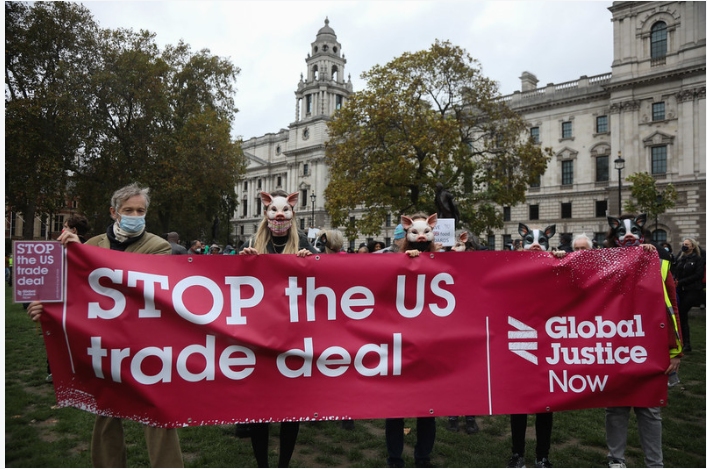

London
On Saturday October 24, there was a successful national day of action around the UK to protest against the government's proposed trade deal with the United States. The protest, which was organised by Global Justice Now, War on Want, Keep Our NHS Public and other organisations, is part of the whole campaign against similar trade deals which will be further enabled by the Trade Bill that the government is now trying to railroad through Parliament. Hundreds took part in the physically-distanced protests in London's Parliament Square, as well as other events organised in Ayrshire, Bexhill and Hastings, Bournemouth, Bradford, Cambridge, Cleveland, Edinburgh, Glasgow, Leeds, London, Macclesfield, Manchester, Merseyside, Newcastle, Nottingham, Oswestry, Oxford, Portsmouth, Reading, Sunderland, York and other cities and towns.

Cleveland
The fifth round of the government's negotiations over the US/UK trade deal took place last week. The negotiations are conducted in secret and are only subject to government updates that provide minimal information. The fourth round of the government's negotiations conducted between the 8-18 September outlined the areas of discussion of the work streams [1] which include, Economics, Market Access, State Owned Enterprises, Cross Border Trade in Services, Industrial Subsidies, Trade Remedies, Sanitary and Phytosanitary (Food Standards) and Financial Services. These updates indeed reveal that under these secret discussions vital questions of the whole economy and society are being put in the hands of those that represent the interests of the global monopolies. Nick Dearden, Director of Global Justice commenting on some of these concerns, said: "Boris Johnson and the Trump administration are rushing to negotiate a trade deal, and unless we kick up a fuss, it will be a disaster for our r ights, services, standards and the environment. They have already made it clear that everything is on the table, including opening up the NHS permanently to American healthcare companies. A trade deal with the US will almost certainly mean that we get chlorinated chicken and much lower food standards, and could well mean that we lose vital rights at work and environmental protections. There is no public support for these changes, but the government is hoping to do it anyway while no one is looking."
This week the opposition to government's trade deal with the US has been focusing on opposition to the passage of the Trade Bill through Parliament. The Trade Bill 2020-21 is in the House of Lords where the Report stage, following the Committee stage, is yet to be announced but is expected in the next two weeks. Already in the Committee stage of the Bill, as it was in the Commons, the Bill has been subject to amendments [2] moved because of the sustained opposition of the people to the passage of the Bill. For example, Amendment 51 aims "to protect the NHS and publicly funded health and care services in other parts of the UK from any form of control from out side the UK" and Amendment 57 aims to give "Parliamentary approval of trade agreement."
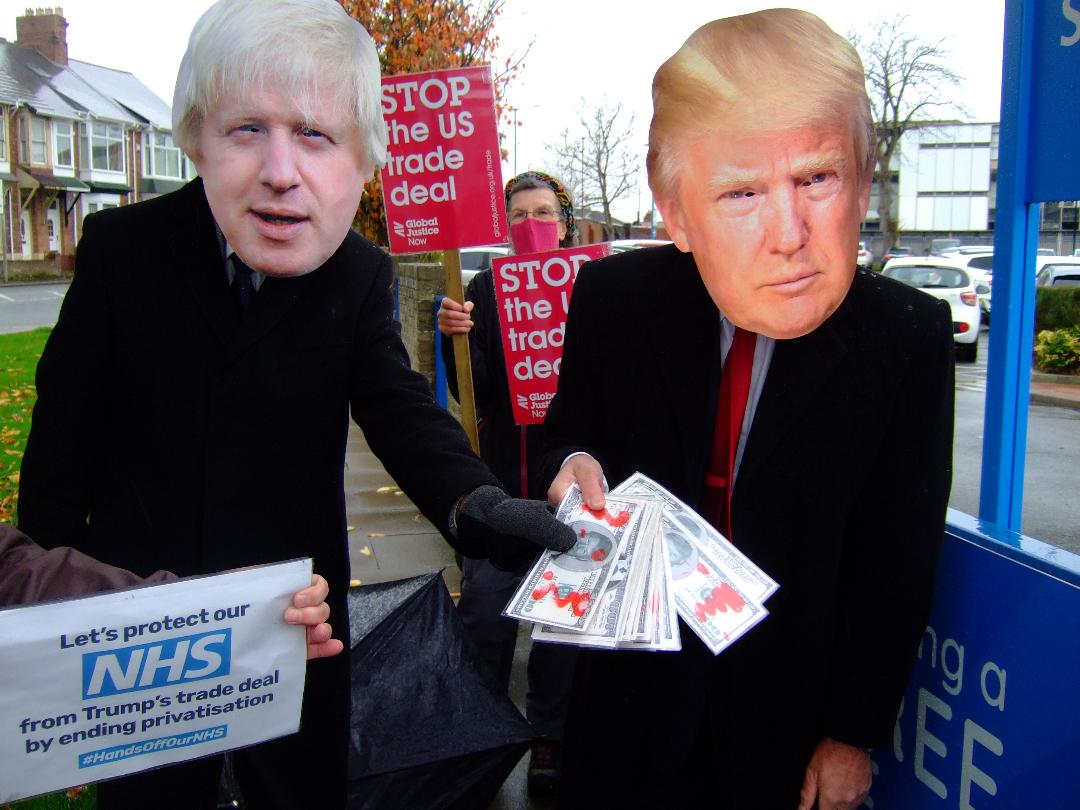
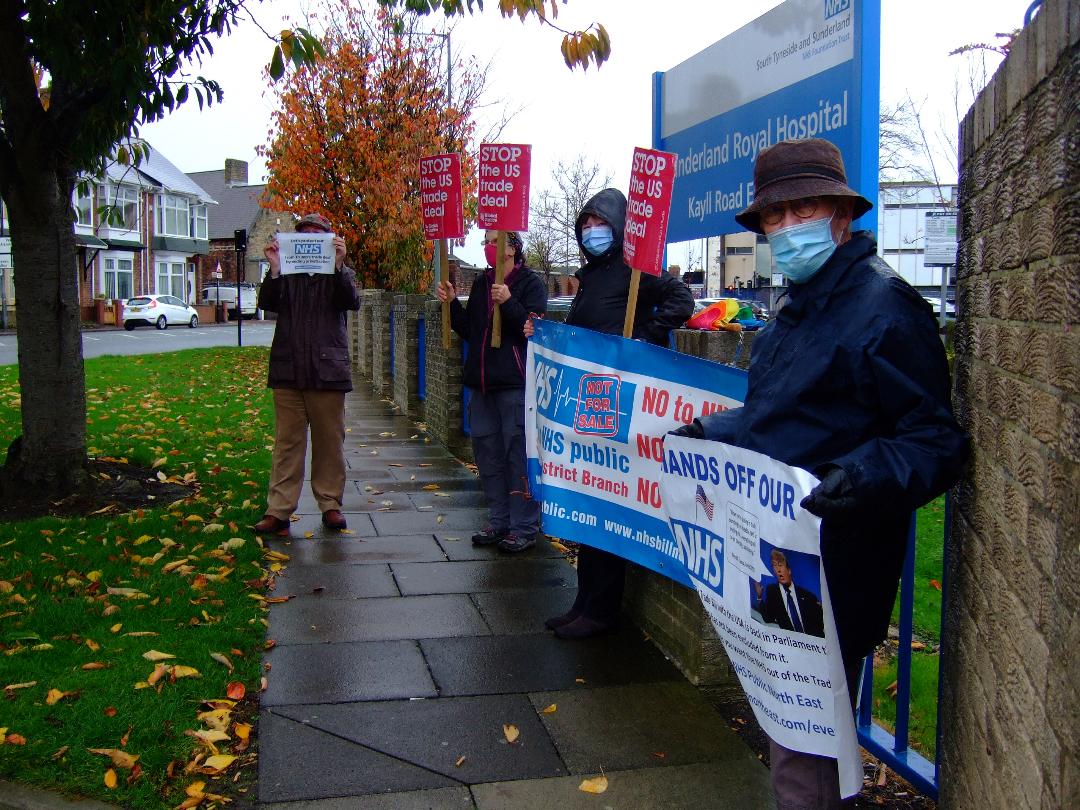
Sunderland
Whether these amendments will get debated and passed in the report stage in the House of Lords is still not clear and of course the government will do everything to overturn any amendments in its final stage when the Bill returns to the commons. But the aim that the people have in opposition to the Trade Bill is now much clearer. What is being revealed in this fight against the Trade Bill is that the government, through its executive power, aims to further hand over control to these international corporations at the expense of the rights and interests of the peoples and nations of Britain as well the peoples and nations worldwide. Whatever happens with the outcome of the Trade Bill, this struggle is bringing to the fore the necessity for the people to have the power to make the decisions [3]. Through their actions, the working class and people are speaking out in the fight to limit the power of the monopolies to impose trade agreements on society that are against the rights and int erests of all at home and abroad.
Notes
[1] Negotiations on the UK's Future Trading Relationship with
the US: Update
https://www.gov.uk/government/news/negotiations-on-the-uks-future-trading-relationship-with-the-us-update--3
[2] Global Justice - Note to editors
The amendments tabled on this issue are:
Amendments on other issues include:
- trade policy and implementation: 9,10, 41
- consistency of trade agreements with other areas of international law and policy including climate and sustainable development: 11, 12, 18, 21, 23, 39, 40, 73
- food, environmental and animal welfare standards: 20, 23, 25, 54, 56, 67, 69, 74
- healthcare, NHS and public services: 13, 51, 75
- investor state dispute settlement (ISDS or "corporate courts"): 17, 44, 52
- data and online, including health data and protection of children online: 16, 34, 71, 72
- impact assessments, including human rights and equalities: 45, 53
- government procurement: 1-6
[3] The Resistance to the Trade Bill Continues - Workers'
Weekly
http://www.rcpbml.org.uk/wwie-20/ww20-37/ww20-37-08.htm
The Necessity to Speak Out in the Fight to Limit the Power of the Monopolies to
Impose Trade Agreements on Society - Workers' Weekly
http://www.rcpbml.org.uk/wwie-20/ww20-28/ww20-28-01.htm
The Necessity to Limit the Power of the Monopolies to Impose Trade Agreements
on Society - Workers' Weekly
http://www.rcpbml.org.uk/wwie-20/ww20-24/ww20-24-01.htm
The Necessity for Trade on an Equal Basis and for Mutual Benefit, Where the
People Decide - Workers' Weekly
http://www.rcpbml.org.uk/wwie-20/ww20-20/ww20-20-08.htm
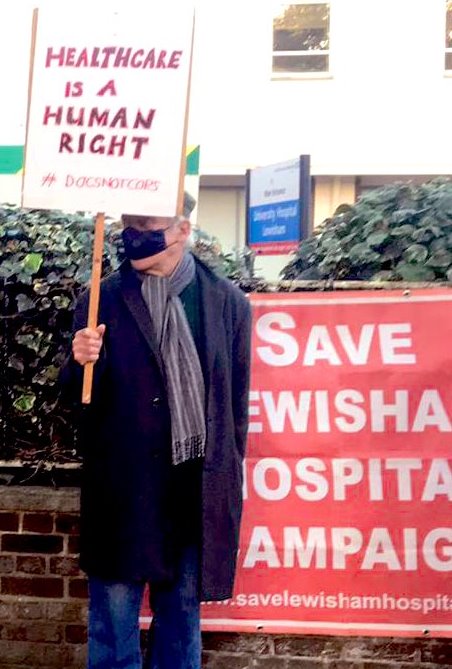
On Friday, October 23, campaigners from the Save Lewisham Hospital Campaign (SLHC) and Lewisham Refugee and Migrant Network held a picket in front of Lewisham Hospital against migrants being charged for NHS treatment. Because of Covid-19 restrictions no leaflets could be given out but the campaigners held up placards saying "Healthcare is a Human Right!", "Cruel NHS Charges Must Stop!", "3 years Upfront Charges Cost Lives!", "End NHS Hostile Environment!", "End Racism in the NHS End All Migrant Charges!". Olivia O'Sullivan, secretary of SLHC gave a spirited speech condemning the "cruel" NHS charges for migrants. She said that pregnant women are being charged over £5000 for having a baby with many women being frightened away by these NHS charges with serious consequences for them and their child's health.
The picket was held on the 3rd anniversary of the introduction of upfront NHS charges for elective care in 2017 as part of the government's "hostile environment" towards immigrants. These NHS charges have been opposed by the British Medical Association which represents all doctors, the Academy of Medical Royal Colleges and the Royal College of Midwives. NHS charges were first instigated by the Thatcher Government in 1989 which deprived a number of migrant groups from access to free NHS care on the basis of not being "ordinarily resident". In 2015, the Cameron government introduced a surcharge of £200 for many migrants to access NHS services, which was subsequently increased to £400, and set charges for those who have not paid the surcharge at 150% of the cost of services.
In 2017 the May government expanded the range of services subject to charges, mandated NHS bodies to charge migrants upfront wherever possible, and insisted they act as an immigration agency by recording people's status.
This policy has no basis in financial terms as this what the government calls "health tourism" only accounts for 0.3% of the NHS budget by the government's own admission.
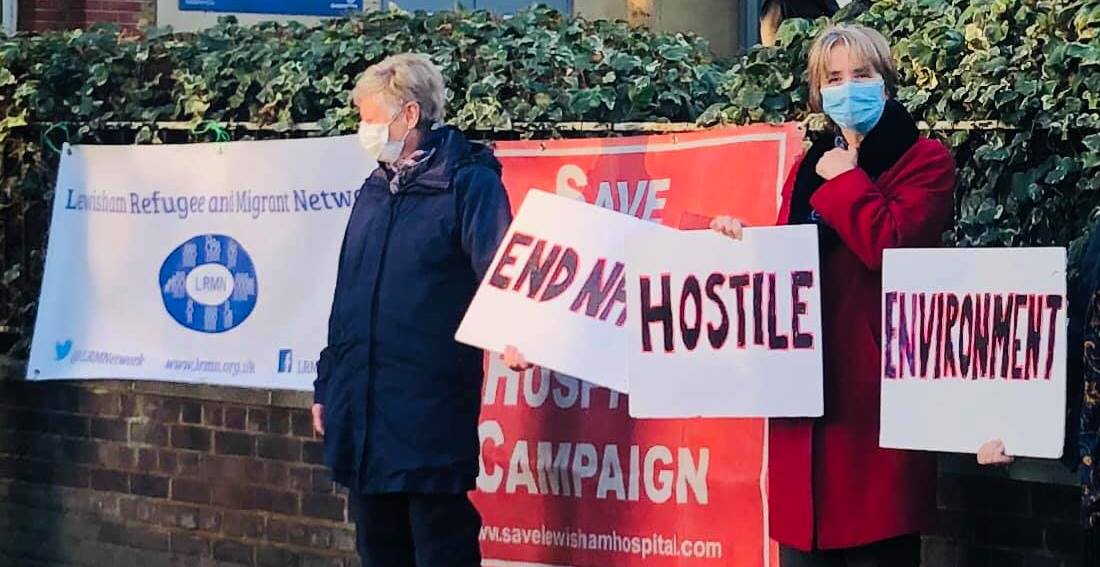
Under this legislation patients who cannot prove their immigration status face upfront charges of up to 150% of the cost of NHS treatment. This vicious and racist government ruling has caused untold hardship with many patients being frightened away from seeking urgent treatment for fear of being faced with heavy charges. These NHS charges brought in by the government are particularly pernicious as they are aimed at vulnerable people on low incomes seeking residential status.
The leaflet which the SLHC has been distributing against the charges points out that these charges completely fly in the face of the founding principle of the NHS which is that healthcare is available to all and based on need, not the ability to pay. The leaflet points out: "Migrants are not 'health tourists' looking for free treatment but vulnerable people often on low incomes, looking for resident status. Hospital trusts including Lewisham and Greenwich Trust are told to check patient details with the Home Office and report anyone who owes £500 for two months or more, unless they have a repayment plan." The SLHC has been campaigning with the local NHS Trust and local councils to end the charges to migrants.
On their website the SLHC says categorically: "The Save Lewisham Hospital Campaign believes that now, more than ever, it is vital to end the hostile environment in the NHS and ensure unfettered access for everyone to free health care. We are one community!"
End NHS Health Charges to Migrants!
Healthcare Is a Right!

There should be a public inquiry into Government contracts granted during Covid-19. Many contracts have been granted without full and open procurement processes. A public inquiry would be able to ascertain whether contracts had been procured fairly and represent value for money for tax payers.
Sign this petition: https://petition.parliament.uk/petitions/328408

Workers at the historic Rolls-Royce factory at Barnoldswick in Lancashire have overwhelmingly voted for industrial action in a battle to preserve a well-known jet engine factory. In August, Rolls-Royce announced that it was intent on offshoring the production of its Trent Engine blades, which are made at the site, to a plant in Singapore, with the loss of 350 local jobs.
Workers, who are members of Unite, recorded a 94 per cent yes vote in favour of industrial action. The union set Rolls-Royce a 96-hour deadline to withdraw its plans to off-shore blade production to Singapore or confirm that comparable alternative work requiring a similar number of workers would be transferred to the plant.
Unite delayed issuing strike dates to give Rolls-Royce a final chance to alter its plans by cancelling its offshoring proposals or by ensuring that Barnoldswick remains viable by introducing similar work and employment levels, to settle the dispute over compulsory redundancies, but with no such commitments forthcoming strike action has been called.
The targeted strike action will begin at 6.30am on November 6 and end at 7pm on November 27.
Since Rolls-Royce's announcement that it was intent on offshoring the work there has been a huge outpouring of opposition in Barnoldswick with the local community uniting to oppose the offshoring and the threat to the factory, which has been vital to the town's economic wellbeing since World War Two.
The announcement of the industrial action comes at a time when Rolls-Royce is seeking £5 billion worth of investment in the form of a £2 billion rights issues, £2 billion worth of bonds and support from the government to the tune of £1 billion.
Unite regional officer Ross Quinn said: "Unite has given Rolls-Royce every opportunity to change its plans, confirm there will be no more compulsory redundancies and guarantee the long-term future of Barnoldswick, but it has refused to do so. To offshore work and destroy the viability of this historic factory would be nothing short of industrial vandalism. As a consequence and as a last resort, Unite has instructed its members to take targeted strike action in order to bring Rolls-Royce to the negotiating table."
Ross Quinn added: "Barnoldswick is the cradle of the jet engine and the workforce and the local community will not allow Rolls-Royce to destroy the viability of the site without a huge fight."
Unite national officer Rhys McCarthy said: "It is simply unacceptable that Rolls-Royce is seeking to offshore the jobs of workers in the UK, while at the same time that it is going cap in hand to the UK government for £1 billion in financial support. There is still time before strike action begins for Rolls-Royce to reverse the decision to offshore jobs, or present alternative plans to ensure the Barnoldswick factory's long term future at similar employment levels. It is hoped it uses the next two weeks wisely. If Rolls-Royce is prepared to propose a viable future for Barnoldswick, then Unite will meet them at any time to resolve this dispute and secure a deal to preserve the jobs and the future of the factory."
(Union News)
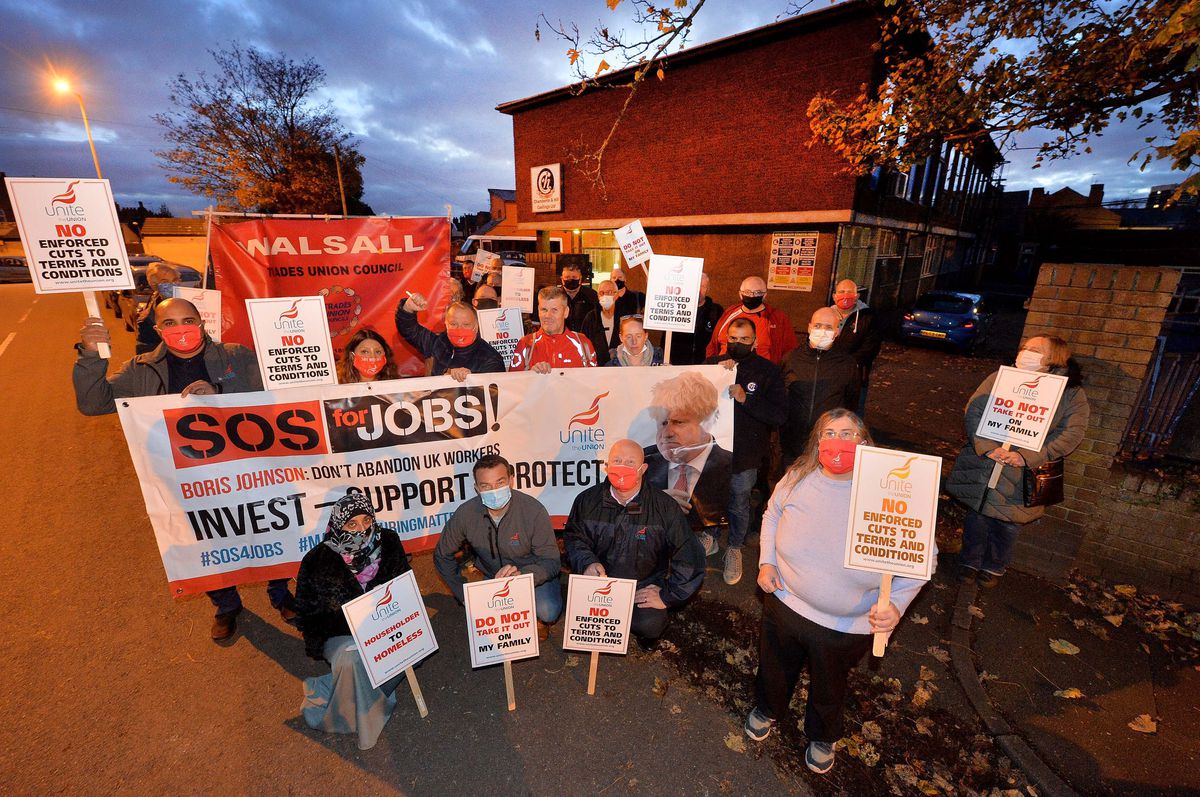
Workers and their union, Unite, organised a powerful
protest and expression of their feelings at this time of
pandemic.
During the pandemic, Chamberlain & Hill Castings Ltd has had the audacity to cut the wages of their workers, but they are not getting off lightly. This section of workers in engineering are showing their traditional consciousness to voice their concerns and organise protest at such an assault on their livelihoods, which threatens themselves and their families.
Workers and their union, Unite, organised a powerful protest and expression of their feelings at this time of pandemic. Taking care to avoid spreading the virus, the workers took social responsibility with social distancing in their demonstration in contrast to the irresponsible actions of the company. The protest took place in view of the whole community outside the gates in Chuckery Road, Walsall, on October 22. Any illusion that engineering in the Midlands is about to roll over and accept such an attack on their conditions is shattered by such action.
The workforce is protesting at changes to terms and conditions arbitrarily forced on the workforce resulting in workers becoming up to £200 a week worse off. Unite made counter-proposals that would have resulted in the company, which produces castings for the automotive industry, making the same level of savings; all proposals were flatly rejected by the management decision-makers. The workers at this particular company are responsible for key components in the supply chain of the car industry. Their action can produce more than ripples in many ways throughout industry. It must become widely known and supported.
Unite is now preparing to hold an industrial action ballot in opposition to the company's actions.
Unite is tying this in with its campaign for greater assistance from the government for the manufacturing sector that has been affected by the Covid-19 pandemic. Unite has launched its SOS for Jobs campaign which calls on the government to follow the lead of other European nations such as France and Germany who are providing a far greater level of assistance to their manufacturing sectors to protect them during the pandemic. The government's job retention (furlough) scheme ends soon and those in the industry, including unions and companies, have indicated that the government's job support scheme is of limited value.
These mass producers of wealth and new value in society, in the tough environment of casting, with the character to shrug off criticism by the owners, are not shy to act with courage and conviction when it comes to acting alongside other workers during this pandemic to turn the situation around to favour their interests and a new direction for the economy.

Hunger marchers at Hyde Park, London, 1932
This month marks the 88th anniversary of the National Hunger March of September-October 1932. It was the largest of a series of hunger marches in Britain during the great depression.
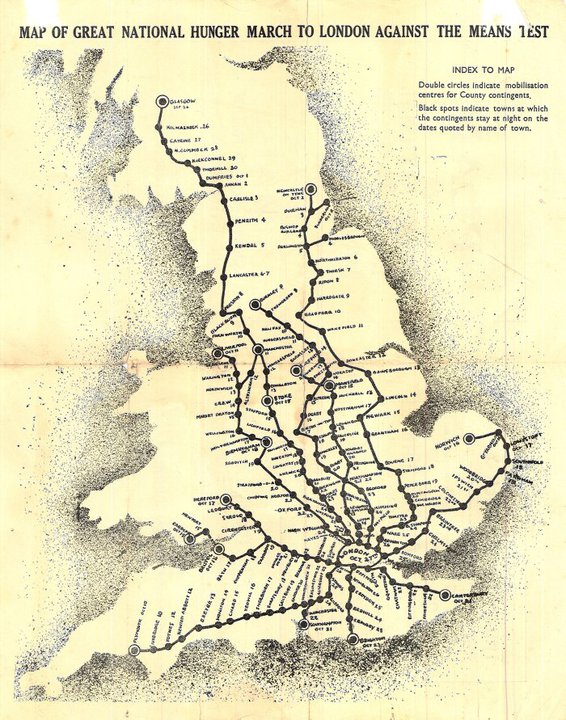
Hunger march route
There had been successive hunger marches to London: miners' contingents, the National Unemployed Workers' Committee Movement and the workers' organisation known as the Minority Movement or National Minority Movement, which had previously been organised on the initiative of the Communist Party of Great Britain (CPGB) in 1922-23, 1929 and 1930. The march of miners from South Wales to London in 1927 represented the whole of the unemployed workers, and called upon all unemployed workers to join the National Unemployed Workers' Committee Movement. Throughout 1932 there was a profound atmosphere of unrest across Britain. Running battles between police and demonstrators took place in Merseyside, Manchester, Birmingham, Cardiff, Coventry, Nottingham, Oldham, Porthcawl, Stoke, Wigan, Preston and Bolton.
The hunger marches continued in South Wales after 1936 but the state took a less confrontational approach because the marches through the Welsh Valleys had grown larger. Workers returning from the Spanish Civil War were disciplined volunteers and much more highly organised after this anti-fascist war.
With unemployment at 2,750,000, came the "Great National Hunger March against the Means Test". The only benefit, the dole, was being limited. They came in eighteen contingents of marchers, mainly from economically depressed areas such as the South Wales Valleys, Scotland and the North of England designed to meet up in Hyde Park in London. A petition containing a million signatures demanded the abolition of the means test and the 1931 Anomalies Act, which was intended to be presented to Parliament after a rally in the park.
The first contingent of marchers left Glasgow on 26 September. Marchers were greeted by a crowd of about 100,000 upon their arrival at Hyde Park on 27 October 1932.
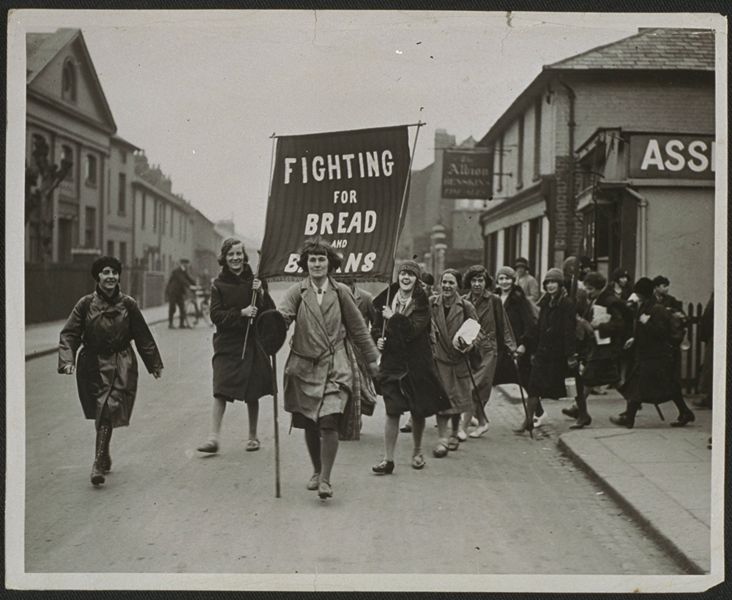
The marchers were condemned by the establishment and its media. They were said to be a threat to order and were met with hysteria. The National Government used force to stop the petition reaching parliament, with it being confiscated by the police.
The Metropolitan Police Commissioner mobilised a total police force of 70,000 against the marchers and their supporters and battles took place around Hyde Park. Mounted police were used to disperse demonstrators, and 75 people were badly injured.
Today, during the conditions of pandemic and economic crisis, it is good to reflect on the period of the great depression of the 1930s, when the workers were organised and turned out in large numbers against unemployment and food shortages. Workers organised to resist the conditions forced upon them. In the conditions of the present, workers and their families cannot and will not allow impoverishment and food shortages to be foisted upon them. This is despite what the authority thinks in its neglect. It is within the context of foodbanks, feeding the isolated during a pandemic, forcing low paid workers and unemployed to skip meals and ensuring children of free meals during school term breaks, that the human factor is mobilised. Workers, through their consciousness and organisation, are striving for empowerment and decision-making powers to change the direction of the economy and relations with nature to resolve current problems. This striving for change is the order of the day.
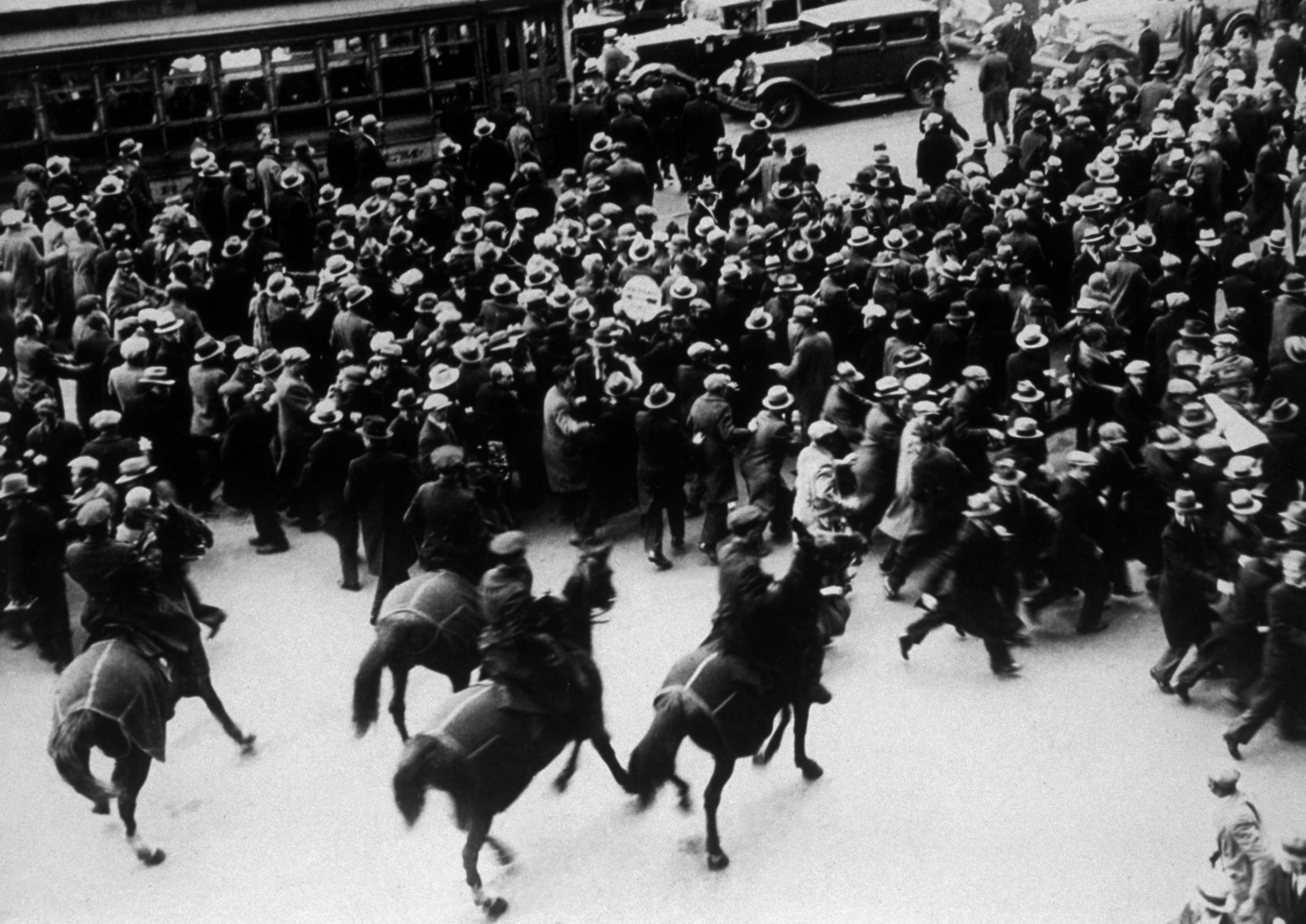
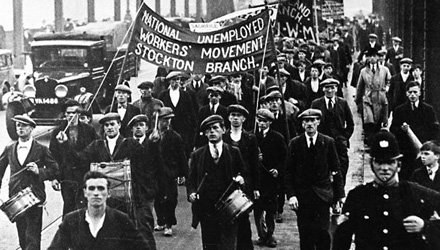
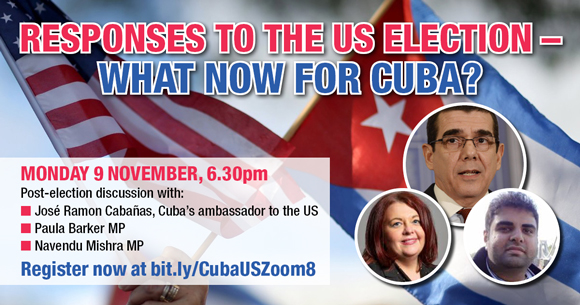
Monday 9 November, 6.30pm
What do the US election results mean for Cuba? Post-election special discussion with José Ramon Cabanas, Cuba's ambassador to the US
Join us just after the US presidential elections for an in depth discussion with the Cuban diplomat who as been at the heart of Cuba-US relations for the last eight years.
Guest speakers
José Ramon Cabanas , became the first Cuban ambassador to the US for 50 years in 2015. He began his mission in the US capital in 2012 and has witnessed the détente between the US and Cuba under President Obama and the complete reversal in policy under Donald Trump. He was also present in April 2020 when 32 shots were fired at the Cuban Embassy in Washington.
Paula Barker MP , represents the constituency of Wavertree in Liverpool and was elected in 2019. Previously she was North West Convenor for Unison.
Navendu Mishra MP , has represented the constituency of Stockport since 2019. Previously he was a shop-floor trade unionist and an organiser for Unison. As a young trade unionist he was a delegate on the 2016 May Day Brigade to Cuba in 2016.
Also in attendance Bárbara Montalvo Alvarez, Cuban ambassador to Britain
This meeting takes place on Monday 9 November, just days after the US presidential election, giving time to assess the results and predict what the new president and make up of Congress may mean for the Cuban people.
Diplomats, politicians and activists will discuss the impact of four year's of the Trump presidency on the economy and people of Cuba, what the worst and best case scenarios might be for the next four years under a Biden or Trump administration, and what role international lawmakers and campaigners have to play in helping to bring about an end to the illegal US blockade.
BOOK YOUR TICKETS TODAY [https://www.eventbrite.com/e/responses-to-the-us-election-what-now-for-cuba-tickets-127176236547]

Joanna Cherry QC
On October 14, a House of Commons debate in Westminster Hall took place on the subject: "Lord Chancellor's Oath and the Rule of Law". Scottish National Party MP Joanna Cherry moved the motion "That this House has considered the Lord Chancellor's oath and the rule of law", focusing on how the UK Internal Market Bill makes a mockery of the oath, "I...do swear that in the office of Lord High Chancellor of Great Britain I will respect the rule of law." Joanna Cherry is a non-practising member of the Scottish Bar, the Faculty of Advocates. We give below extensive extracts from her presentation. While cast in the form of a defence of the rule of law, they expose how far the ruling elite has gone, and very rapidly, to erase the very conception that civil society should be governed by the rule of law, but that their powers should be unlimited and unchecked, while speaking of the supremacy of parliament and a rules-based international order.
***
The Advocate General for Scotland tendered his resignation in the wake of the statement by the Secretary of State for Northern Ireland that the United Kingdom Internal Market Bill would
"break international law in a very specific and limited way."-[Official Report, 8 September 2020; Vol. 679, c. 509.]
[...]
In addition to the UK Internal Market Bill, we currently have two further Bills before Parliament that are unprecedented in legal terms. Both the Overseas Operations (Service Personnel And Veterans) Bill and the Covert Human Intelligence Sources (Criminal Conduct) Bill seek to create special classes of defendants in domestic law in respect of whom the criminal law will not apply [...].
We also have reviews pending in administrative law and human rights that would appear to threaten the scope for British citizens to challenge unlawful actions of this Government in court. Of course, part 5 of the Internal Market Bill already seeks to do that in respect of certain aspects of the Northern Ireland protocol.
There are concerns that the Internal Market Bill will undermine the Good Friday agreement. It certainly runs a coach and horses through the devolution settlement and makes a nonsense of promises made to Scottish voters during the 2014 independence referendum.
[...]
My purpose in holding this debate today is to draw attention to the very real threats to the rule of law currently posed by the actions of this Government and to ask the Lord Chancellor, having regard to his oath, what he intends to do about them.
There has been trenchant criticism from various quarters, fully rehearsed in debates in this House, about the legal implications of part 5 of the Internal Market Bill. For example, the Bar Council and the Law Society of England and Wales have said that the clauses contained in part 5 of the Bill, "enable ministers to derogate from the United Kingdom's obligations under international law in broad and comprehensive terms and prohibit public bodies from compliance with such obligations. They represent a direct challenge to the rule of law, which include the country's obligations under public international law".
As we have heard, that is why the Advocate General for Scotland tendered his resignation.
The Attorney General for England and Wales has attempted to justify her support for the Internal Market Bill by reference to the legal doctrine of the supremacy of Parliament and the judgment of the UK Supreme Court in the first case brought by Gina Miller on the circumstances surrounding the triggering of article 50. In that case, the Supreme Court held that, to be binding in domestic law, treaty obligations require to be enshrined in an Act of Parliament, but it also held that treaties between sovereign states, such as the withdrawal agreement, have effect in international law and are not governed by the domestic law of any state. It was clear that such treaties are binding on the UK under international law. I believe that the Attorney General has selectively quoted the case in order to justify her view of the Internal Market Bill. I want to know whether the Lord Chancellor agrees with me that a proper reading of the case makes a clear distinction between the domestic law and the doctrine of supremacy of Parliament, and the United Kingdom's international legal obligations.
What I am talking about was made very clear when Professor Catherine Barnard, who is the professor of European Union law at the University of Cambridge, gave evidence recently to the Committee on the Future Relationship with the European Union. She was crystal clear that while the United Kingdom Parliament may be sovereign under domestic law that does not impact on the rules of international law, and articles 26 and 27 of the Vienna convention mean that in international law international legal obligations take precedence. Professor Barnard also explained that there is a strong argument that the very existence of the Bill itself puts the United Kingdom in breach of its duty of good faith under article 5 of the withdrawal agreement.
[...]
I know that many cheerleaders for the Bill in Parliament have been keen to emphasise section 38 of the European Union (Withdrawal Agreement) Act 2020, which restated the principle of the sovereignty of the Westminster Parliament. Of course that doctrine is a doctrine of the domestic law of England. It does not reflect the Scottish constitutional tradition, but that is perhaps an argument for another day. However, it is worth mentioning, because this Parliament is a Union Parliament, created by a treaty between two sovereign nations, Scotland and England. The United Kingdom is not a unitary state. It is a state of two countries that came together to form a Union. That fact is of relevance when we come to look at the impact of what is now clause 47 of the Internal Market Bill on the supervisory jurisdiction of the Court of Session in Scotland. It is also a point that may be of some relevance should the Scottish Government carry out their threat to litigate over the terms of the Inter nal Market Bill.
[...]
The Lord Chancellor has endeavoured in the public domain to justify the fact that he has not, unlike the Advocate General for Scotland, resigned as a result of the Bill. He told Sky News last month that he would resign if the Government broke international law "in a way that cannot be...fudged".
Can the Minister explain to us whether the Lord Chancellor's position is that the UK Government are already breaking international law, but he is happy with that because they are doing it in a way that can be fudged? He also said that he will resign only if the Government break the law in a way that is "unacceptable". What is an acceptable way of breaking the law? I am sure the thousands of ordinary members of the public who have been fined for breaking lockdown regulations, while Mr Cummings did so with impunity, would like to know from the Lord Chancellor's Department how he distinguishes between acceptable and unacceptable breaches of the law.
[...]
We have seen very much from comments not just from the Irish Foreign Minister, who described the amendments as "smoke and mirrors", but also from senior Democrat and Republican politicians in the United States of America, that what really matters is the international perception of the Bill. I think the former Prime Minister [Theresa May] was trying to persuade her colleagues in Government that the amendments [that the powers now contained in part 5 of the Bill will be used only if the European Union is in material breach of its obligations] do not make any difference to the international perception of what the Bill seeks to do.
The former Prime Minister also reminded us that an arbitration process is set down in the withdrawal agreement. She said:
"There is an arbitration process available. Under article 175, the ruling of the arbitration panel should be binding on the UK and the EU. The Government have acknowledged the existence of the arbitration procedure, but they are saying that they would enter into that in parallel with the operation of the elements of this Bill. The message, it seems to me, is very clear, which is, if we do not like the outcome of the arbitration panel, then we will break international law and we will not accept it. Yet, again, that is breaking the international treaty-an agreement that UK Government signed-because it is breaking article 175, which says that the view of the arbitration panel shall be 'binding' on both parties."-[Official Report, 21 September 2020; Vol. 680, c. 666.]
[...]
Finally, I want to turn to look at the implications of the UK Internal Market Bill for the Union between Scotland and England and for the position of Northern Ireland. [...] There are [...] very concerning implications for undertakings made in respect of human rights protections in the north of Ireland from the British Government, both in the Good Friday agreement and in the withdrawal agreement. Once again, that is not just my view; it is the view of the Northern Ireland Human Rights Commission and the Equality Commission for Northern Ireland, who have advised that the Bill undermines "the Belfast (Good Friday) Agreement commitment to ensure incorporation of the ECHR [European Convention on Human Rights], including access to the courts and remedies for breach of the ECHR rights. The Commissions are further concerned that the proposed amendments risk diminishing the commitment in Article 2(1) of the Ireland/Northern Ireland Protocol to ensure there is no diminution of rights, safeg uards or equality of opportunity as the UK leaves the EU."
It has been made clear in the Chamber by hon. Members representing the Social Democratic and Labour party and the Alliance party in the north of Ireland that concerns about human rights implications of the Bill go right to the heart of the Good Friday agreement. Indeed, litigation is already contemplated by a group of concerned Northern Ireland citizens, who have instructed solicitors and counsel.
I turn to the position of Scotland, which is of course a particular concern to me as the Member of Parliament for Edinburgh South West and the Scottish National party's justice and home affairs spokesperson. As well as breaking international law, the powers that the UK Government seek to give themselves in the Internal Market Bill constitute an unprecedented threat to the powers of Scotland's Parliament and the devolution settlement. Why is that relevant to the Lord Chancellor's oath to uphold the rule of law? It is relevant because-as we saw from the House of Lords Constitution Committee report-the Lord Chancellor also has an important role in protecting the constitution of the United Kingdom. The constitution of the United Kingdom includes the devolved settlement.
Last weekend in Scotland we marked the 20th anniversary of the death of the distinguished Labour party politician Donald Dewar, who was Scotland's first ever First Minister under devolution. He was also the architect of the scheme of devolution set out in the Scotland Act 1998 whereby every power not specifically reserved to this Parliament is devolved to the Scottish Parliament. The Bill introduces-for the first time-a new principle into the devolution settlement by providing broad cross-cutting powers to allow Ministers to enforce internal market provisions across devolved fields. That is not my analysis, I am reading from the analysis of Professor Michael Keating of the Centre on Constitutional Change.
Clause 50 reserves state aid to Westminster, after a dispute in which the Welsh and Scottish Governments argued that it had been devolved. Clause 48 gives UK Ministers wide powers to spend in devolved fields, which changes the previous assumption that they would spend only in reserved fields and that-with a few exceptions-financial transfers to the devolved administrations would go through the block allocation governed by the Barnett formula. That succinct analysis by Professor Michael Keating is the explanation of why the Bill undermines the devolved settlement. Holyrood is not getting any new powers that it did not already have, but Westminster is getting back sole control over state aid, and-in order to enforce the internal market-UK Ministers are getting an explicit power to cut across decision-making by the Scottish Parliament in a whole range of devolved fields.
It seems that what we are seeing, by virtue of those provisions in the Bill, is a rebalancing of the constitutional settlement as far as devolution is concerned, and a tearing up of the clear delineation between reserved powers and devolved powers that was devised by the late Donald Dewar, and set out in the Scotland Act 1998. That is important not just because it undermines the devolved settlement, but it is also important from a wider constitutional perspective, because in 2014-when people living in Scotland were asked whether they wanted to remain part of the United Kingdom or return to our previous status as an independent sovereign nation-various promises were made by those urging us to remain part of the United Kingdom. One promise in particular was that if we did so our Parliament would get more powers, we would be strengthened, and we would become - to quote another Labour politician - "the most powerful devolved parliament in the world".
These were not promises made just by Labour politicians, they were promises made Conservative and Unionist politicians who, of course, are now the party of Government in the United Kingdom. A further Scotland Act was passed in 2016 that puts the Sewel convention on a statutory basis, and entrenched the Scottish Parliament against abolition. In terms of section 63A of the Scotland Act it cannot be abolished without a referendum in Scotland. The Internal Market Bill circumvents these protections not by abolishing the Scottish Parliament, but by removing the power it previously had to act unilaterally across a whole range of competencies that impact on the day-to-day lives of people living in Scotland. It is a very significant change, and some would say a complete and absolute undermining of the devolved settlement voted for by 75% of the people in the 1997 referendum. Thanks to the decision in the United Kingdom Supreme Court in the first Miller case, we now know that the Sewel conve ntion was not justiciable despite being put on a statutory footing.
We also know, because of the Government's subsequent actions, that the Sewel convention cannot protect the devolved settlement. The Sewel convention says:
"Westminster would not normally legislate with regard to devolved matters...without the consent of the Scottish Parliament."-[Official Report, House of Lords, 21 July 1998; Vol. 592, c. 791.]
Recently, however, that has been honoured more in the breach than in the observance. Last week, the Scottish Parliament withheld legislative consent to the United Kingdom Internal Market Bill, but nobody seriously thinks that the Bill will not proceed because of that.
Indeed, the Institute for Government recently said that the "Sewel Convention has been broken by Brexit", but I would argue that the Bill breaks the devolution settlement. That is important because, as I said, the constitutional relationship-the constitution of the United Kingdom-is the responsibility of the Lord Chancellor. The constitutional relationship between Scotland and England is about not just devolution but the Act of Union, which continues because of promises made in 2014 that are broken by the Bill.
I suggest that many people in Scotland have suspected for a long time that the British Government's word is no longer their bond, and that perception is reinforced by the Bill. The problem for the Lord Chancellor is that that perception is reinforced not just in Scotland, but across the world. In Europe, and as far as the United States of America, there are concerns about the implications of the Bill for the rule of law.
[...]
I, like many lawyers in Scotland, not all of whom, like myself, want to see an independent Scotland, but all of whom care about the independence of the Scottish legal system, are concerned about the provisions in part 5 of the Bill and their implications for the supervisory jurisdiction of the Court of Session and for judicial review. In Scotland, judicial review is part of our system of civil justice, which is a devolved matter under the Scotland Act 1998 and therefore the preserve of the Scottish Parliament.
More importantly, in the constitutional and pre-devolution context, the authority and privileges of the Court of Session, including its inherent supervisory jurisdiction, are protected by article 19 of the treaty of Union between Scotland and England, which states:
"That the Court of Session, or College of Justice, do after the Union, and notwithstanding thereof, remain in all time coming within Scotland, as it is now constituted by the laws of that kingdom, and with the same authority and privileges as before the Union, subject nevertheless to such regulations for the better administration of justice, as shall be made by the Parliament of Great Britain".
It is a widely held view that legislation that sought to narrow the scope of the Scottish Court's powers of judicial review and to curtail the right of judicial review could scarcely be described as for the better administration of justice. Accordingly, should the United Kingdom Government seek to circumscribe the supervisory jurisdiction of the Court of Session, they would be interfering with not only the devolved powers of the Scottish Parliament, but the treaty of Union.
[...]
To summarise, we need to see the United Kingdom Internal Market Bill in relation to Scotland through the prism not only of devolution, which is a modern development, but of the treaty of Union between Scotland and England. Without a Scottish Law Officer in place, this is an area in which the Lord Chancellor would be well advised, I respectfully submit, to take more of an interest.
[...]
I finish by saying that there is a pattern of the United Kingdom finding ways to worm its way around laws and agreements freely entered into. Because of his oath to respect the rule of law, the Lord Chancellor is in a different class of Minister. What is he going to do about that pattern? What is he going to do to honour his oath? On taking office, he spoke of his illustrious predecessors as Lord Chancellor of England and drew a comic veil over some of the less illustrious ones. I guess my question for the Lord Chancellor today is: does he want to be remembered as a Thomas More or a Richard Rich? [1]
***
Note
[1] Richard Rich was born in London about the year 1496, and as
a boy he was intimate with Sir Thomas More, who, when he was on trial through
Rich's treachery, said, "Of no small while I have been acquainted with you
and your conversation, who have known you from your youth hitherto. For we long
dwelled both in one parish together, where, as yourself can tell, you were
esteemed very light of your tongue, a great dicer and not of commendable fame.
And so at your house in the Temple (where hath been your chief bringing up)
were you likewise accounted." [...] [Richard Rich] brought Sir Thomas More
to the block, who at his trial said, "If this oath of yours, Mr. Rich, be
true, then pray I that I may never see God in the face . . . . In faith, Mr.
Rich, I am sorrier for your perjury than for my own peril, and you shall
understand that neither I, nor no man else to my knowledge, ever took you to be
a man of such credit as in any matter of importance I or any other would at any
time vouchsafe to communicate with you." British History
Online
Receive Workers'
Weekly E-mail Edition: It
is free to subscribe to the e-mail edition
We encourage all those who support the work of RCPB(ML) to also support it
financially:
Donate to
RCPB(ML)
Workers' Weekly is the weekly on
line newspaper of the
Revolutionary Communist Party of Britain (Marxist-Leninist)
Website:
http://www.rcpbml.org.uk
E-mail:
office@rcpbml.org.uk
170, Wandsworth Road, London, SW8 2LA.
Phone: 020 7627 0599: